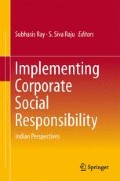Abstract
In post- liberalization India, corporate social responsibility (CSR) has broader implications for the nation than ever before. It reduces dependence on the government for action on social issues. The majority of government programs has become enmeshed in political manipulation, corruption and bitter infighting. As per the latest guidelines released by the Government of India, one of the important objectives for the implementation of CSR schemes by Central Public Sector Enterprise (CPSE) is to generate community goodwill, create social impact and visibility. Oil India Limited (OIL), a Navaratna (The Government of India, in 1997, accorded the status of ‘Navratna’ nine Public Sector Enterprises (PSEs) which gave them greater autonomy to compete in the global market so as to “support [them] in their drive to become global giants”. Since then, the number of PSEs with a ‘Navratna’ status has been raised to 15. SOURCE: wikipedia.org) PSE that has a large footprint in Assam, considers community development (CD) as a key element of its CSR program. Assam is the gateway to north-east India and is not yet free from ethnic conflicts, insurgency and governance issues. There is a need for public-private partnership with well-defined controls, processes and the optimum use of resources to achieve social change. Participatory planning, building local capacities and financial sustainability can reinforce peace and tranquility in the region. It has been seen in the last decade that OIL, with its proactive approach towards community development, has generated immense goodwill which has benefited the company and the larger community in Assam. The central argument of this paper is that globalization, liberalization and forces of isomorphism have changed stakeholder expectations and are now of increased importance in managing business that is based on “beyond profit” motives and in a socially responsible way. The author has adopted the exploratory research design with qualitative techniques to cite OIL’s community development initiatives.
Access this chapter
Tax calculation will be finalised at checkout
Purchases are for personal use only
References
Chauhad T (2007) Corporate social and environmental responsibility in India-Assessing the UN global compacts role, German development institute, Boon. http://www.die-gdi.de. Accessed 27 May 2009
Ismail M (2009) Corporate social responsibility and its role in community development: An International Perspective, Journal of International Social Research, Vol-2 Issue-9, 2009 http://www.core.kmi.open.ac.uk/download/pdf/694741.pdf. Accessed 27 Sept 2010
Lee S (2009) Corporate social responsibility in India-A case study. Oxford achilles working groupon CSR. http://www.sbs.oxa.ac.uk/achilles/downloads/research/india.pdf. Accessed 27 Sept 2010
Narwal M, Sharma T (2008) Perception of corporate social responsibility in India: an emperical study (spring). J Knowl Globalis 1(1)
Sial F (2011) The pros and cons of corporate social responsibility: the case of India. Business Times
Owen DP (2007) Beyond corporate social responsibility: the scope for corporate investment in community driven development. World Bank Report No 37379-GLB
Annual Reports of Oil India Limited (2010) http://www.oil-india.com/Document/financial/Annual_Report_09_10.pdf. Accessed 21 Nov 2010
Annual Reports of Oil India Limited (2011) http://www.oil-india.com/Document/financial/Annual_Report_10__11.pdf. Accessed on 7 Dec 2011
Author information
Authors and Affiliations
Corresponding author
Editor information
Editors and Affiliations
Rights and permissions
Copyright information
© 2014 Springer India
About this chapter
Cite this chapter
Dhar, P. (2014). Corporate Social Responsibility and Community Development in Assam: A Case Study of Oil India Limited. In: Ray, S., Siva Raju, S. (eds) Implementing Corporate Social Responsibility. Springer, New Delhi. https://doi.org/10.1007/978-81-322-1653-7_13
Download citation
DOI: https://doi.org/10.1007/978-81-322-1653-7_13
Published:
Publisher Name: Springer, New Delhi
Print ISBN: 978-81-322-1652-0
Online ISBN: 978-81-322-1653-7
eBook Packages: Business and EconomicsBusiness and Management (R0)

